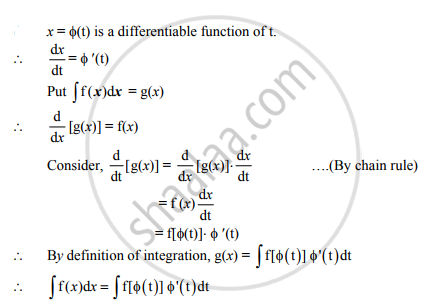Advertisements
Advertisements
प्रश्न
If x = Φ(t) differentiable function of ‘ t ' then prove that `int f(x) dx=intf[phi(t)]phi'(t)dt`
उत्तर

APPEARS IN
संबंधित प्रश्न
Solve the differential equation cos(x +y) dy = dx hence find the particular solution for x = 0 and y = 0.
Solve : 3ex tanydx + (1 +ex) sec2 ydy = 0
Also, find the particular solution when x = 0 and y = π.
Find the particular solution of differential equation:
`dy/dx=-(x+ycosx)/(1+sinx) " given that " y= 1 " when "x = 0`
Find the particular solution of the differential equation x (1 + y2) dx – y (1 + x2) dy = 0, given that y = 1 when x = 0.
Verify that the given function (explicit or implicit) is a solution of the corresponding differential equation:
x + y = tan–1y : y2 y′ + y2 + 1 = 0
Verify that the given function (explicit or implicit) is a solution of the corresponding differential equation:
`y = sqrt(a^2 - x^2 ) x in (-a,a) : x + y dy/dx = 0(y != 0)`
Find the differential equation of the family of concentric circles `x^2 + y^2 = a^2`
The general solution of the differential equation \[\frac{dy}{dx} + y \] cot x = cosec x, is
The solution of the differential equation \[x\frac{dy}{dx} = y + x \tan\frac{y}{x}\], is
The solution of the differential equation (x2 + 1) \[\frac{dy}{dx}\] + (y2 + 1) = 0, is
The number of arbitrary constants in the particular solution of a differential equation of third order is
Which of the following differential equations has y = x as one of its particular solution?
Solve the differential equation (x2 − yx2) dy + (y2 + x2y2) dx = 0, given that y = 1, when x = 1.
x (e2y − 1) dy + (x2 − 1) ey dx = 0
cos (x + y) dy = dx
\[\frac{dy}{dx} - y \tan x = e^x \sec x\]
`y sec^2 x + (y + 7) tan x(dy)/(dx)=0`
`(2ax+x^2)(dy)/(dx)=a^2+2ax`
\[\cos^2 x\frac{dy}{dx} + y = \tan x\]
Find the particular solution of the differential equation \[\frac{dy}{dx} = - 4x y^2\] given that y = 1, when x = 0.
For the following differential equation, find the general solution:- \[\frac{dy}{dx} = \frac{1 - \cos x}{1 + \cos x}\]
For the following differential equation, find the general solution:- \[\frac{dy}{dx} = \sin^{- 1} x\]
Solve the following differential equation:-
y dx + (x − y2) dy = 0
Find the equation of the curve passing through the point (1, 1) whose differential equation is x dy = (2x2 + 1) dx, x ≠ 0.
Find the equation of a curve passing through the point (−2, 3), given that the slope of the tangent to the curve at any point (x, y) is `(2x)/y^2.`
The general solution of the differential equation x(1 + y2)dx + y(1 + x2)dy = 0 is (1 + x2)(1 + y2) = k.
x + y = tan–1y is a solution of the differential equation `y^2 "dy"/"dx" + y^2 + 1` = 0.
Solution of the differential equation tany sec2xdx + tanx sec2ydy = 0 is ______.
Integrating factor of `(x"d"y)/("d"x) - y = x^4 - 3x` is ______.
The integrating factor of the differential equation `("d"y)/("d"x) + y = (1 + y)/x` is ______.
The general solution of the differential equation (ex + 1) ydy = (y + 1) exdx is ______.
The solution of the differential equation `("d"y)/("d"x) + (2xy)/(1 + x^2) = 1/(1 + x^2)^2` is ______.
The solution of the differential equation `x(dy)/("d"x) + 2y = x^2` is ______.
General solution of `("d"y)/("d"x) + y` = sinx is ______.
Number of arbitrary constants in the particular solution of a differential equation of order two is two.
Find the particular solution of the following differential equation, given that y = 0 when x = `pi/4`.
`(dy)/(dx) + ycotx = 2/(1 + sinx)`
Find the particular solution of the differential equation `x (dy)/(dx) - y = x^2.e^x`, given y(1) = 0.
